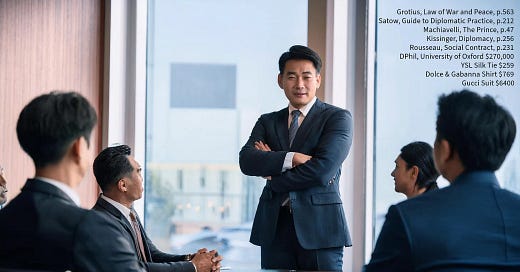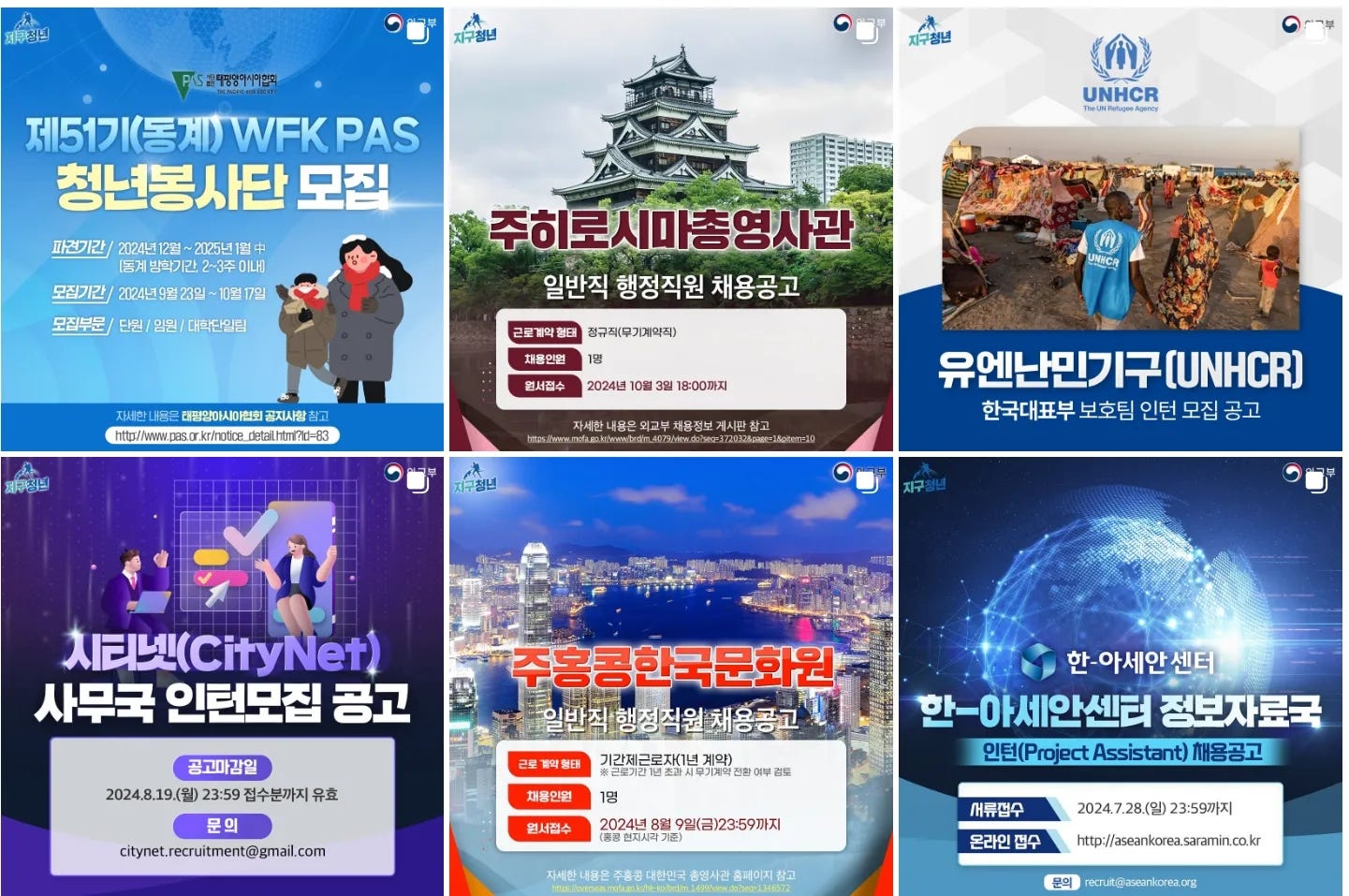Becoming a diplomat in Korea
A highly structured path of competitive education, training, assessment, tests and interviews that mean nothing in the real world
In South Korea, careers in foreign affairs have always been highly sought after. Earlier generations of diplomats were connected to the ruling elite, wealthy enough to study overseas (when very few did), and wealthy and able to secure access and graduate from either Seoul National University, Korea University, and Yonsei University) institute, respectively. While the most blatant markers of elitism have been removed, the modern diplomatic profession still holds a degree of prestige.
Individuals aspiring to work in foreign affairs typically follow a highly structured path, balancing academic preparation with professional experience and rigorous selection processes.
The journey often starts at high school. The journey towards a foreign affairs career often begins with a robust academic background. Most individuals aim to attend prestigious universities, with Seoul National University, Korea University, and Yonsei University (the so-called "SKY" universities) being popular choices. A major in political science, international relations, or economics is common, though degrees in law or languages are also seen as valuable. Students are encouraged to develop a deep understanding of global issues, diplomacy, trade policies, and foreign languages.
During undergraduate studies, students interested in diplomacy often participate in debate clubs, Model United Nations, or foreign language societies and pursue internships at embassies and foreign companies. Aspiring students often participate in youth programs, seek internships to gain relevant experience in Korean agencies. The Ministry of Foreign Affairs (MOFA) Korea Foundation, and Korea Trade-Investment Promotion Agency (KOTRA) run programs for students and offer internship programs for students interested in diplomacy, trade, and international relations. These experiences help candidates build professional networks, understand the intricacies of government work, and apply theoretical knowledge in real-world contexts. These activities also help build the curriculum vitae.
Proficiency in foreign languages is also essential for those seeking to work in foreign affairs. English is the most important, given its global use, but proficiency in Chinese, Japanese, and the U.N. official languages not mentioned (Arabic, French, Russian, Spanish) is also valued. Many students spend time abroad either through exchange programs or language courses in countries where these languages are spoken. All pursue certifications that demonstrate their capacity.
Compulsory military service for males can add to skills, connections, and curriculum vitae points. Most prominent among these is working as KATUSA (Korean Augmentation to the United States Army), interpreter and translator programs, and signals and intelligence.
While a bachelor's degree is typically the minimum requirement for entry into the field, many pursue master’s degrees in areas like international relations, public policy, or international law, either domestically or abroad, most often in countries like the United States or the United Kingdom. Programs in institutions such as the Johns Hopkins School of Advanced International Studies (SAIS), the London School of Economics (LSE) or as is the case anywhere in Korea, any school with a brand name that’s as well known as YSL, Louis Vuitton or Dolce & Gabbana.
For many, the primary aim is to become a foreign service officer (FSO) or diplomat. The FSO exam in Korea is highly competitive and has several stages, including written tests and interviews, much like in many other countries. The written portion covers topics such as international law, economics, and politics, and includes sections in both Korean and English (or another foreign language). Many students will undertake intensive training in preparation for the exam, run by one of the several government exam training institutes or hagwon, sometimes for up to a year after finishing university. Success in the exam opens the door to the Korea National Diplomatic Academy.
For most Koreans wanting to work in foreign affairs, the ultimate goal is the KNDA. The main program for diplomatic candidates, known as the Diplomatic Candidate Program (DCP), typically spans two years with the hope of training and preparing future diplomats of South Korea with the necessary knowledge, skills, and competencies to effectively represent the country in international affairs. The KNDA's curriculum is structured to comprehensive, combining theoretical knowledge with practical skills across various disciplines:
International Relations and Diplomacy
International Relations Theory: Study of global political dynamics, power structures, and international systems.
Diplomatic History: Exploration of historical diplomatic events, treaties, and their impact on modern diplomacy.
Global Governance: Understanding international organizations like the UN, WTO, IMF, and their roles.
Foreign Policy and Strategy
South Korean Foreign Policy: In-depth analysis of South Korea's foreign policy objectives, regional strategies, and international partnerships.
Policy Formulation and Analysis: Techniques for developing and evaluating foreign policy initiatives.
International Law
Public International Law: Principles governing relations between states, including treaties, sovereignty, and human rights.
Law of the Sea, Air, and Space: Legal frameworks for maritime, aerial, and space activities.
Economics and Trade
International Economics: Global economic theories, trade relations, and financial systems.
Trade Negotiations: Skills for negotiating bilateral and multilateral trade agreements.
Economic Policy: Understanding economic policies affecting international trade and investment.
Security and Peace Studies
International Security: Concepts of national security, defense policies, and global security challenges.
Conflict Resolution: Strategies for peaceful resolution of international conflicts.
Non-Proliferation: Study of efforts to prevent the spread of weapons of mass destruction.
Area and Regional Studies
Regional Politics: Political, economic, and cultural studies of key regions like East Asia, the Americas, Europe, Africa, and the Middle East.
Emerging Markets: Analysis of developing economies and their roles in global affairs.
Foreign Languages
Language Proficiency: Intensive training in languages critical for diplomacy, such as English, Chinese, Japanese, Russian, Arabic, or Spanish.
Diplomatic Communication: Emphasis on language skills for negotiations, official correspondence, and public speaking.
Public Diplomacy and Cultural Studies
Cultural Diplomacy: Use of cultural assets to promote national interests and mutual understanding.
Media Relations: Managing relationships with international media, public opinion, and information dissemination.
Soft Power Strategies: Leveraging non-coercive means to influence international relations.
Practical Skills Development
Negotiation and Mediation: Techniques and simulations to enhance negotiation skills in bilateral and multilateral settings.
Protocol and Etiquette: Training in international diplomatic protocols, ceremonies, and etiquette.
Consular Affairs: Handling of consular services, protection of nationals abroad, and crisis management.
Cadets go through a range of simulations and role-playing (mock negotiations, crisis management exercises, multilateral negotiation simulations, and role-playing to mimic real-life diplomatic scenarios).
Cadets can undertake short-term assignments within the Ministry of Foreign Affairs or other governmental agencies (often when additional bodies are needed, such as the hosting of an international diplomatic event, national disaster, or consular crisis), and can even sometimes pursue opportunities to work in South Korean embassies or international organizations abroad.
Cadets can also participate in expert lectures led by seasoned diplomats, scholars, and international experts (usually because their boss says they must attend to fill up the numbers), and participate in workshops focused on leadership, strategic thinking, ethics, and crisis communication.
Finally, cadets have a choice to pursue research. They can undertake a thesis or capstone project on relevant international issues, culminating in a written report and presentation; and can write policy analysis papers on current foreign policy challenges and recommendations, which will be published if it fits the current agenda of the government.
The journey’s done. Success! Every aspiring diplomat’s dream is to graduate from KNDA and have their photo in the graduating class hung up on that wall in a long line of South Korea’s diplomats right back to the earliest days. But they can’t celebrate too soon - the first thing a Korean diplomat learns on their first posting abroad is that everything they learnt and every test they passed at KNDA means nothing in the real world.




